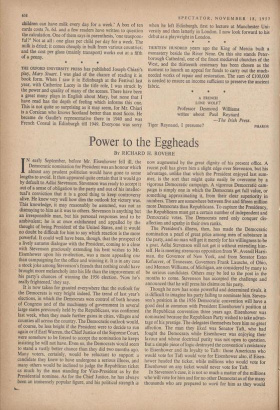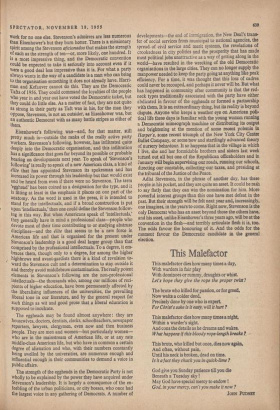Power to the Eggheads
BY RICHARD H. ROVERE /N early September, before Mr. Eisenhower fell ill, the Democratic nomination for President was an honour which almost any prudent politician would have gone to some lengths to avoid. It then appeared quite certain that it would go by default to Adlai Stevenson. Stevenson was ready to accept it out of a sense of obligation to the party and out of his intellec- tual's conviction that it is a good thing to keep controversy alive. He knew very well how dim the outlook for victory was. This knowledge, it may reasonably be assumed, was not as dismaying to him as it was to others. Stevenson is anything but an irresponsible man, but his personal responses tend to be ambivalent; he is at once exhilarated and appalled by the thought of being President of the United States, and it would no doubt be difficult for him to say which reaction is the more powerful. It could well have been, though, that the prospect of a lively autumn dialogue with the President, coming to a close with Stevenson graciously extending his best wishes to Mr. Eisenhower upon his re-election, was a more appealing one than campaigning for the office and winning it. It is in any case a stock joke among Stevenson's friends that nothing could have brought more melancholy into his life than the improvement of his party's chances of winning the 1956 election. 'Now he's really frightened,' they say.
It is now taken for granted everywhere that the outlook for the Democrats is very bright indeed. The trend of last year's elections, in which the Democrats won control of both houses of Congress and of the machinery of government in several large states previously held by the Republicans, was confirmed last week, when they made further gains in cities, villages and counties all across the country. The Democratic outlook would, of course, be less bright if the President were to decide to run again or if Earl Warren, the Chief Justice of the Supreme Court, were somehow to be forced to accept the nomination he keeps insisting he will not have. Even so, the Democrats Would seem to stand a vastly better chance than they did two months ago. Many voters, certainly, would be reluctant to support a candidate they knew to have undergone a serious illness, 4nd many others would be inclined to judge the Republican ticket as much by the man standing for Vice-President as by the Presidential nominee. As for the Chief Justice, he has always been an immensely popular figure, and his political strength is now augmented by the great dignity of his present office. A recent poll has given him a slight edge over Stevenson, but his advantage, unlike that which the President enjoyed last sum- mer, is the sort that might quite easily be overcome by a vigorous Democratic campaign. A vigorous Democratic cam- paign is simply one in which the Democrats get full value, or something approximating it, from their clear superiority in numbers. There are somewhere between five and fifteen million more Democrats than Republicans. To capture the Presidency, the Republicans must get a certain number of independent and Democratic votes. The Democrats need only conquer dis- affection and apathy in their own ranks.
The President's illness, then, has made the Democratic nomination a pearl of great price among men of substance in the party, and no man will get it merely for his willingness to be a goat. Adlai Stevenson will not get it without extending him- self. He is meeting strenuous opposition from W. Averell Harri- man, the Governor of New York, and from Senator Estes Kefauver, of Tennessee. Governors Frank Lausche, of Ohio, and Mennen Williams, of Michigan, are considered by many to be serious candidates. Others may be led to the post in the months to come. Stevenson has accepted the challenge and announced that he will press his claims on his party.
Though he now has some powerful and determined rivals, it is difficult to imagine his party failing to nominate him. Steven- son's position in the 1956 Democratic convention will have a good deal in common with President Eisenhower's position at the Republican convention three years ago. Eisenhower was nominated because the Republican Party wished to take advan- tage of his prestige. The delegates themselves bore him no great affection. The man they liked was Senator Taft, who had fought the Democrats while Eisenhower was enjoying their favour and whose doctrinal purity was not open to question. But a simple piece of logic destroyed the convention's resistance to Eisenhower and its loyalty to Taft : those Americans who would vote for Taft would vote for Eisenhower also, if Eisen- hower headed the ticket, while millions who would vote for Eisenhower on any ticket would never vote for Taft.
In Stevenson's case, it is not so much a matter of the millions who will vote for him and for no other Democrat as of the many thousands who are prepared to work for him as they would work for no one else. Stevenson's admirers are less numerous than Eisenhower's but they burn hotter. There is a missionary Spirit among the Stevenson aficionados that makes the strength of each as the strength of ten—or, more likely, one hundred. It is a most impressive thing, and the Democratic convention could be expected to take it seriously into account even if it were a good deal less impressive than it is. For what a party always wants in the way of a candidate is a man who can bring to the organisation something it does not already have. Harri- man and Kefauver cannot do this. They are the Democratic Tafts of 1956. They could command the loyalties of the people Who year in and year out have voted the Democratic ticket, but they could do little else. As a matter of fact, they are not quite as strong in their party as Taft was in his, for the man they Oppose. Stevenson, is not an outsider, as Eisenhower was, but an authentic Democrat with as many battle stripes as either of them.
Eisenhower's following was—and, for that matter, still pretty much is—outside the ranks of the really active party workers. Stevenson's following, however, has infiltrated quite deeply into the Democratic organisation, and this infiltration has a significance that goes far beyond its possible or probable bearing on developments next year. To speak of 'Stevenson's following' is really to speak of a new American class, a kind of elite that has appointed Stevenson its spokesman and has increased its power through his leadership but that would exist and be heard from even if there were no Stevenson. The term 'egghead' has been coined as a designation for the type, and it is fitting at least in the emphasis it places on one part of the anatomy. As the word is used in the press, it is intended to stand for the intellectuals, and if a broad construction is put Upon 'intellectuals,' then one could define the Stevenson follow- ing in this way. But when Americans speak of 'intellectuals,' they generally have in mind a professional class—people who devote most of their time contributing to or studying abstruse disciplines—and the elite that seems to be a new force in American life and that is organised for the present under Stevenson's leadership is a good deal larger group than that Comprised by the professional intellectuals. To a degree, it em- braces them, though only to a degree, for among the higher highbrows and avant-gardists there is a kind of revulsion to- ward the Stevenson cult and a determination to stay outside it and thereby avoid middlebrow contamination. The really potent elements in Stevenson's following are the non-professional intellectuals—the thousands who, among our millions of reci- pients of higher education, have been permanently affected by the liberalising influences of the universities, the prevailing liberal tone in our literature, and by the general respect for such things as wit and good prose that a liberal education is supposed to inculcate.
The eggheads may be found almost anywhere : they are housewives, doctors, dentists, clerks, schoolteachers, newspaper reporters, lawyers, clergymen, even now and then business People. They are men and women—but particularly women— who are in the mainstream of American life, or at any rate middle-class American life, but who have in common a certain degree of alienation and who, with their numbers constantly being swelled by the universities, are numerous enough and influential enough in their communities to demand a voice in public affairs.
The strength of the eggheads in the Democratic Party is not Wholly to be explained by the power they have acquired under Stevenson's leadership. It is largely a consequence of the en- feebling of the urban politicians, or city bosses, who once had the largest voice in any gathering of Democrats. A number of developments—the end of immigration, the New Deal's trans- fer of social services from municipal to national agencies, the spread of civil service and merit systems, the revelations of crookedness in city politics and the prosperity that has made most political jobs unattractive as a way of getting along in the world—have resulted in the wrecking of the old Democratic organisations in the large cities. They can no longer supply the manpower needed to keep the party going at anything like peak efficiency. For a time, it was thought that this loss of cadres could never be recouped, and perhaps it never will be. But what has happened in community after community is that the red- neck types traditionally associated with the party have either abdicated in favour of the eggheads or formed a partnership with them. It is an extraordinary thing, but its reality is beyond dispute. Anyone who keeps a weather eye on American poli- tical life these days is familiar with the young woman running a Democratic mimeograph machine or distributing its output and brightening at the mention of some recent polemic in Harper's, some recent triumph of the Now York City Center Ballet Company, or some new and startlingly advanced theory of nursery behaviour. It so happens that in the village in which I live, she and her formidable brothers and sisters last week turned out all but one of the Republican officeholders and in January will begin supervising our roads, running our schools, directing our constable, collecting our taxes, and presiding at the tribunal of the Justice of the Peace.
Adlai Stevenson, in the phrase of another day, has these people in his pocket, and they are quite an asset. It could be rash to say flatly that they can win the nomination for him. More powerful interest groups than this one have met defeat in the past. But their strength will be felt next year and, increasingly. one imagines, in the years to come. Right now, Stevenson is the only Democrat who has an asset beyond those the others have, and his asset, unlike Eisenhower's three years ago, will be at the convention in the flesh—and terribly articulate flesh it is, too. The odds favour the honouring of it. And the odds for the moment favour the Democratic candidate in the general election.











































































 Previous page
Previous page